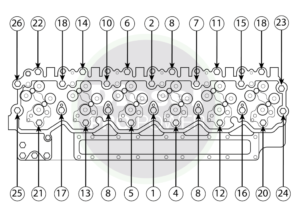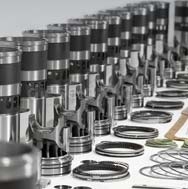November 11, 2024
Components and Maintenance: Role of Exhaust Valves and Manifolds, Cleaning Buildup, and Ensuring Free Airflow
Exhaust Valves:
Exhaust Manifold:
Turbocharger (if equipped):
Exhaust Piping and Muffler:
Heat Shields and Insulation:
Inspection Tips: Detecting Exhaust Leaks or Valve Wear that Can Impact Engine Performance
Detecting Exhaust Leaks:
Inspecting Exhaust Valves for Wear:
Checking for Carbon Buildup:
Examining the Turbocharger (if applicable):
Inspecting Manifold and Pipe Connections:
Monitoring for Excessive Noise or Vibrations:
Read More
November 11, 2024
Why Torque Specs Are Important For Your Marine Diesel Engine Repairs
1. Preventing Engine Failure
2. Ensuring Proper Sealin
3. Maintaining Engine Efficiency
4. Prolonging Engine Life
5. Safety Considerations
6. Following Manufacturer Guidelines
Cummins Engine Torque Specs
Detroit Diesel Engine Torque Specs
Conclusion
Read More
November 11, 2024
Mechanical Injectors for the Detroit Diesel 92 Series Marine Engines
Electronic Injectors for the Detroit Diesel 92 Series Marine Engines
Choosing the Right Injector for Your Detroit Diesel 92 Series Marine Engine
Note That The Injectors In Your Engine May Not Be What The Serial Number Calls For
We Do Not Recommend Changing Injector Types Simply To Add Horsepower
Diesel Pro Power: Your Source for Detroit Diesel Injectors
Read More
November 11, 2024
How Detroit Diesel 2-Cycle Engines Work
Key Phases of the Two-Stroke Cycle
Important Components
The Detroit Diesel 2-Cycle Engine Series
Aftermarket Parts For Detroit Diesel 53 Series Engines
Aftermarket Parts For Detroit Diesel 71 Series Engines
Aftermarket Parts For Detroit Diesel 92 Series Engines
Aftermarket Parts For Detroit Diesel 149 Series Engines
Benefits of Detroit Diesel 2-Cycle Marine Engines
Why Detroit Diesel 2-Cycle Engines Remain Popular Today
Conclusion
Read More
November 11, 2024
1. Loss of Power and Efficiency
2. High Oil Consumption
3. Excessive Smoke
4. Difficulty Starting the Engine
5. Increased Noise and Vibrations
6. Excessive Blow-By
7. Coolant or Oil Leaks
8. Exceeding Service Hours or Engine Lifespan
9. Rising Maintenance Costs
10. Preparing for Extended Service Life
Read More
November 11, 2024
Overview of the Detroit Diesel 16V92
Specifications for the Detroit Diesel 16V92 Non-Turbo Model
Key Specifications for the 16V92 Non-Turbo:
Specifications for the Detroit Diesel 16V92 Turbo Model
Key Specifications for the 16V92 Turbo:
Advantages of the Turbocharged vs. Non-Turbo Models
Turbocharged Model:
Non-Turbo Model:
Diesel Pro Power: Aftermarket Support for the Detroit Diesel 16V92
Conclusion
Read More




 Free US Calls: 1-888-433-4735
Free US Calls: 1-888-433-4735 International: 305-545-5588
International: 305-545-5588




